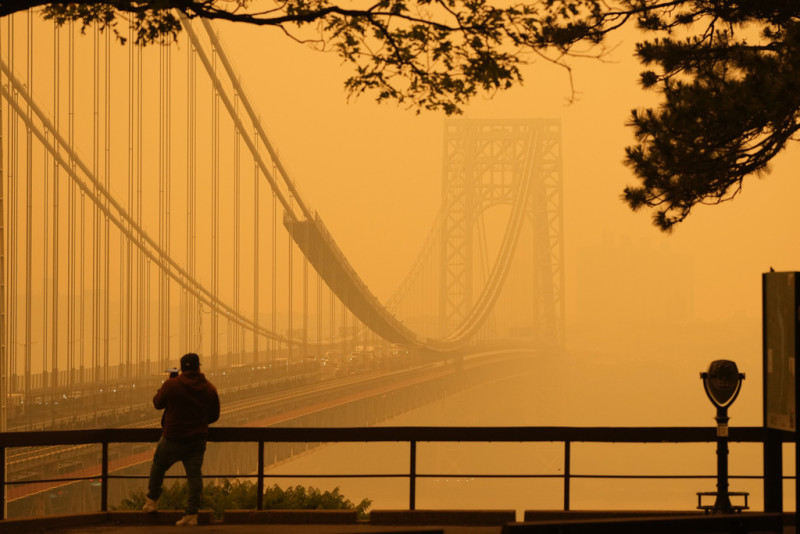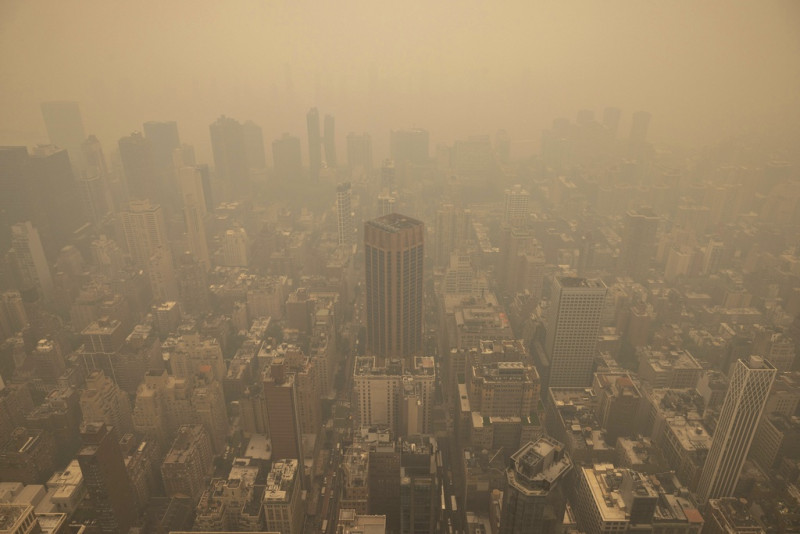Nearly 140 fires were active in Canada yesterday, including about 40 that are classified as out of control
Quebec, hard hit by wildfires of historic proportions, is eagerly awaiting international aid as smoke from some 400 fires in Canada reaches the US, where 100 million Americans breathe extremely poor air quality.
The developments in Canada are “yet another alarming indication of how the climate crisis is affecting our lives,” White House spokeswoman Karin Jean-Pierre said Wednesday.
After the Canadian provinces of Alberta (west) and Nova Scotia (east), it is Quebec’s turn to experience wildfires of an extent “never seen before”: nearly 140 fires were active yesterday, including about 40 that are classified as out of control, according to the Society for the Protection of Forests from Fires (Société de protection des forêts contre le feu, SOPFEU). And no rain is expected before Monday night.
Canada is on track to face its worst-ever year of wildfire destruction. Blazes are burning in nearly all Canadian provinces and territories, and federal government officials said their modeling shows increased wildfire risk in most of Canada through August https://t.co/QU7KK6eXkm pic.twitter.com/QF5AAOCb3H
— Reuters (@Reuters) June 6, 2023
“With the staff we have at the moment we can barely deal with almost 40 fires at the same time,” said provincial premier Francois Legault. As a result, authorities are forced to delay efforts to control some and focus “on locations where the situation is urgent,” he continued.
Quebec authorities have deployed hundreds of people in the field. With international help, in particular the approximately one hundred firefighters from France, who are expected to arrive in the province by tomorrow Friday, they hope to reach 1,200.
“Guys, we… I almost died.”
A filmmaker in Canada has captured the intensity and spread of wildfires raging in Nova Scotia, as he drove down a highway ⤵️ pic.twitter.com/x9uCKviVO8
— Al Jazeera English (@AJEnglish) May 30, 2023
“Hundreds of American firefighters have arrived in Canada and others are on the way,” Canadian Prime Minister Justin Trudeau said last night after his conversation with US President Joe Biden.
The latter “ordered his team to deploy all available federal firefighting resources (…) to put out the fires affecting Canadian and American communities,” the White House announced.
Fires are becoming more common “because of climate change,” Trudeau said.
Available equipment and available personnel will be critical in the coming days, Canadian authorities acknowledge.
Orange smog in New York
Smoke from wildfires is causing a stifling atmosphere in the northeastern US.
In New York, the Statue of Liberty and the skyscrapers of Manhattan were covered in an orange haze, while masks – remnants of the new coronavirus pandemic – made their appearance again on the streets.
Visibility has decreased so much that the US Civil Aviation Authority (FAA) has slowed air traffic and even grounded flights.
American authorities also called on citizens to “take precautions” given the rapid deterioration of air quality.
Emergency air quality warnings due to fires in Canada affected more than 100 million Americans yesterday, the Environmental Protection Agency (EPA) told AFP.
The warnings are for residents of most of the northeastern US, from Chicago in the north to Atlanta in the south. Air quality in this zone “is primarily affected by wildfires in Canada, but other local pollutant emissions and meteorological conditions may also play a role,” the EPA said.
Over 20,000 Canadians are fleeing their homes
More than 20,000 Canadians were forced to stay away from their homes across the country yesterday, more than half of them in Quebec, where authorities are preparing to evacuate an additional 4,000 residents.
Like other 7,500 of her fellow citizens, Nancy Netsolnier explained via Facebook that she left at 02:00 on Wednesday the city of Sibougamo, Quebec (north), together with her partner and their two huskies.
“We decided to leave by boat, which allowed us to take some important things with us,” he said, adding that he feared losing everything.
The situation “is very stressful,” Daniel Harvey, a resident of Chape, a nearby town where residents are preparing to leave, told La Presse newspaper. The father prepares a “departure kit for each child: documents, hard drives, photos. We don’t know when it will happen, so we have to act as if everything is going to burn.
The French-speaking Canadian province has recorded 443 fires since the beginning of the year, compared to an average of 200 in the corresponding period of the last ten years.
The situation is also described by the authorities as excellent in terms of the area that has been burned so far this time of the year. Canada as a whole is experiencing a year without precedent: 38 million hectares have burned, a total far higher than the average for the past few decades.
Canada, which due to its geographical location is experiencing a faster increase in temperature than the rest of the planet, has been faced in recent years with extreme weather events, the intensity and frequency of which is increasing due to climate change.
Source :Skai
With a wealth of experience honed over 4+ years in journalism, I bring a seasoned voice to the world of news. Currently, I work as a freelance writer and editor, always seeking new opportunities to tell compelling stories in the field of world news.












